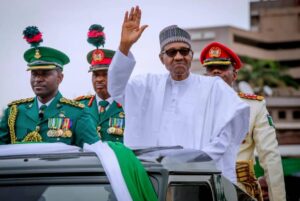When President Bola Ahmed Tinubu assumed office on May 29, 2023, Nigeria stood on the edge of a financial abyss. According to Taiwo Oyedele, Chairman of the Presidential Committee on Tax Reforms, the country’s economic situation was dire enough that without urgent action, Nigeria risked becoming another Sri Lanka, where citizens once queued for hours only to find that ₦10,000 (in equivalent terms) could not even buy a single liter of petrol.

Oyedele’s remarks offer not just an explanation of why Tinubu’s reforms were necessary, but also a sobering reminder of how close Nigeria came to collapse.
The Near-Precipice: A Broken Economy
When Tinubu took over, Nigeria’s fiscal reality was alarming:
The NNPC had mortgaged much of the country’s future crude oil production to service debts and finance subsidy payments. As Oyedele revealed, only about 200,000 barrels of oil per day — a fraction of Nigeria’s 1.8–2 million barrels/day capacity — was not encumbered by forward contracts.

The Federal Government had resorted to reckless “ways and means” financing from the Central Bank, printing over ₦30 trillion just to keep cash flowing — a policy that fueled inflation and undermined the naira.
Dollar inflows were far less than outflows, depleting reserves and forcing Nigeria to depend on borrowing for basic obligations.
The fuel subsidy, costing trillions annually, drained revenue while benefiting smugglers and the wealthy more than ordinary citizens.
Without radical reform, Oyedele warned, Nigeria would have suffered the same fate as Sri Lanka, which in 2022 defaulted on its debts, ran out of fuel, and descended into social unrest.
The Bold Reforms: Tinubu’s First Acts in Office
Faced with these grim realities, President Tinubu acted decisively on day one:
1. Fuel Subsidy Removal – Ending a decades-long drain on national revenue. Oyedele emphasized that under no condition can subsidy return, because it would “wreck the economy completely.”

2. Exchange Rate Unification – Floating the naira to eliminate arbitrage that favored a few at the expense of the nation, thereby restoring some credibility to the currency regime.
3. Tax Reforms Agenda – Empowering the Presidential Committee to overhaul Nigeria’s broken tax system, expand revenue, and enforce compliance, especially among large corporations that evade taxes.
4. Debt Transparency and Restructuring – Acknowledging the reality of Nigeria’s unsustainable debts while creating strategies for responsible borrowing, similar to other countries that used loans as stepping stones to recovery.
According to Oyedele, these reforms stabilized a collapsing economy that was heading toward bankruptcy.
 Comparative Lessons: Why Reforms Were Inevitable
Comparative Lessons: Why Reforms Were Inevitable
Nigeria’s reforms may be painful, but global history proves they are necessary:
Sri Lanka (2022): Collapsed under the weight of unsustainable subsidies, foreign debt, and low reserves. The country ran out of fuel, food prices tripled, and government credibility crumbled. Nigeria was on the same path.
Indonesia (1997–1999): During the Asian financial crisis, Indonesia faced collapse. The government removed subsidies, floated its currency, and launched social safety nets. Within five years, the economy stabilized, and growth resumed.

Brazil (1994–1998): The “Real Plan” stabilized Brazil’s hyperinflation through bold monetary reforms, subsidy cuts, and foreign borrowing, with short-term pain but long-term gain.
India (1991): Facing bankruptcy, India liberalized its economy, removed controls, and borrowed from the IMF under tough conditions. Today, India is among the fastest-growing major economies.
The lesson is clear: no country survived economic collapse without enduring painful reforms.
Why Subsidy Removal Was Non-Negotiable
Nigeria’s fuel subsidy, costing over ₦4 trillion annually, was a fiscal cancer. It:
Consumed almost all oil revenues, leaving nothing for health, education, or infrastructure.
Enriched smugglers who sold cheap Nigerian fuel in neighboring countries.
Encouraged corruption within NNPC and government institutions.
Oyedele argued that if subsidy had continued, Nigeria would already be bankrupt, with no foreign reserves, no fuel, and no investor confidence.

Borrowing as a Survival Tool
While critics attack borrowing, Oyedele noted that responsible borrowing is not unusual. Nations like South Korea, Singapore, and India borrowed extensively during reforms — but invested in infrastructure, education, and industry to spur growth.
Nigeria, he stressed, must borrow smartly while reforming taxation to widen revenue and build credibility.
The Pain and the Promise: Why the Worst is Over
Reforms inevitably bring hardship. Prices rise, the currency shakes, and ordinary citizens feel the pinch. But Oyedele assured Nigerians that the worst is already over.
Inflation, though high, is beginning to stabilize.
The naira, while under pressure, has gained transparency, improving investor perception.
Revenue is improving through taxation and subsidy savings.
Safety nets, including targeted subsidies on food, healthcare, and transport, are being designed to cushion the poor while reforms take root.

The Road Ahead: From Hardship to Hope
Nigeria at 65 faces a familiar test: whether to endure short-term pain for long-term prosperity, or to relapse into old cycles of corruption and populism.
Oyedele’s message is that Tinubu’s government chose the path of courage. By removing subsidies, floating the naira, and beginning tax reforms, Nigeria avoided the precipice of collapse.
The challenge now is for government to:
1. Deliver visible safety nets to ease hardship.
2. Ensure transparent use of savings and taxes to build public trust.
3. Communicate reforms clearly so Nigerians see that pain today is the price of progress tomorrow.
Conclusion: A Narrow Escape, A New Beginning
Nigeria nearly became another Sri Lanka. Its crude oil mortgaged, its reserves depleted, its debts ballooning, and its revenues hijacked by subsidies, the country was heading for collapse.

But decisive reforms pulled Nigeria back from the brink. The worst may be over, but the journey to recovery is ongoing. For once, Nigerians must look beyond propaganda and short-term discomfort to see the bigger picture: a foundation is being laid for future stability.
History shows that bold reforms always hurt before they heal — but they also always deliver if leaders stay the course. Tinubu has chosen courage over convenience. For Nigeria, the choice now is whether to endure the storm to see the sunrise.
Princess G. Adebajo- Fraser. MFR.
The National Patriots.
Governance & Perception Management Consultant.
Public Analyst.
CEO Fraser Consulting Consortium.
THE TRUTH.
Nigeria’s Bold Reforms: The Rescue Mission & Path to Recovery
In May 2023, Nigeria was on the brink of collapse — subsidies drained trillions, reserves were near zero, and oil futures mortgaged. Taiwo Oyedele warned that without action, Nigeria risked a “Sri Lanka scenario” where fuel was unaffordable.
President Tinubu acted decisively: subsidy removal, exchange rate unification, and tax reforms.
World Bank (2024): “Since May 2023, Nigeria has embarked on far-reaching and long-overdue reforms … the supply of foreign exchange has improved.”
Indermit Gill, World Bank Chief Economist: “It is very difficult to do these things, but the rewards are massive. Nigeria will need to stay the course.”
The IMF also urged subsidy removal, calling it unsustainable. These reforms saved Nigeria an estimated $5.1 billion in 2023 alone.
The hardest storm is passing. With safety nets and transparency, Nigeria’s future is secure. 🇳🇬
Reforms are painful — but survival and prosperity demand them.
Full report on www.headlinenews.news




